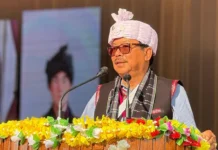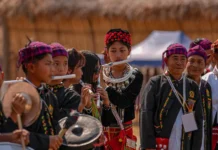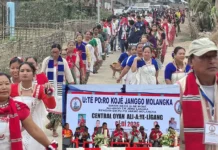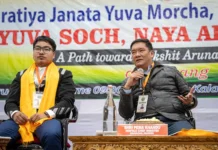Flights Of Fantasy
[ M Panging Pao ]
Elections are on us with the upcoming simultaneous Lok Sabha and asembly polls in the next few weeks. The entire nation, state government, political parties and aspiring candidates are gearing up for the upcoming elections with political activities heating up everywhere.
As per reports, the rate of expenditure for an MLA candidate is about Rs 10-20 crore in Arunachal. With very less voters in the constituencies of just 8,000-12,000, a candidate could win an election by bagging just 2,500-5,000 votes. Since the votes required to win elections are very less, candidates could win by simply luring/buying voters with goodies and cash. Buying votes in other constituencies of the country may not be possible due to the large numbers of voters of about 1.5 to 2 lakhs. Voters are offered tractors, motorcycles, vehicles, generators, smart phones, cash, etc. A few ‘local leaders’ are offered lucrative contracts and posts after elections.
These ‘gifted items’ cost large amounts of money. Where does this money come from? How do candidates get so much money to lure voters with these ‘gifts and cash’? It appears that these large amounts of money are ‘managed and adjusted’ from public projects/schemes. Post elections, most elected candidates recover these huge amounts spent on elections from upcoming public projects and schemes. This process of recovering spent election amounts adversely impacts development projects, education, health, agri-horticulture, industries, tourism, etc. Having sold their votes, can common citizens blame the government and elected representatives only for corruption, nepotism and less development? By selling their votes to the highest bidders, can common citizens be absolved of their culpability in abetting corruption?
When we sell our votes, we transform into marketable commodities like dal, salt, sugar, soap, etc. Whenever elections occur once in five years, individual voters may earn a few thousand rupees. However, against this few thousand rupees gained individually, development projects/schemes worth thousands of crores of rupees are degraded or diluted. These degraded/diluted projects have direct impact on the quality of education of our children, the quality of healthcare, the quality of roads/railways, the quality of electricity, the quality of water supply, the quality of industries, etc. Just to gain a few thousand rupees, we compromise development, progress, education, health, water supply, employment, etc. More jobs would be created for our youths only through more industries, agripreneurship, tourism, etc.
Democracy is defined as ‘government by the people, government of the people, and government for the people’. Democracy is considered by many as the best form of government due to the fundamental principle that, irrespective of caste, creed, gender and religion, all citizens are eligible to vote to elect their representatives. Democracy empowers common citizens to ‘vote out’ their representatives in case of non-performance, nepotism, corruption, ideology, etc. This basic tenet of democracy is diluted or destroyed by selling our votes to the highest bidder.
Should citizens sell their valuable votes? Would you sell your vote to the highest bidder? (The contributor is retired Group Captain, Indian Air Force)




